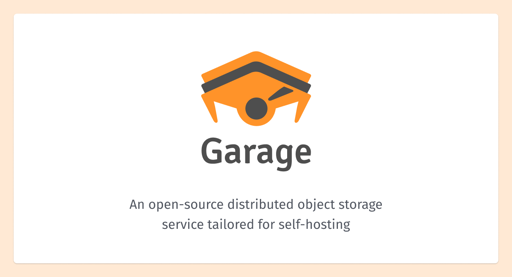Garage - S3-compatible Object Storage alternative to Minio
(garagehq.deuxfleurs.fr)
from kiol@lemmy.world to selfhosted@lemmy.world on 26 May 2025 11:32
https://lemmy.world/post/30296165
from kiol@lemmy.world to selfhosted@lemmy.world on 26 May 2025 11:32
https://lemmy.world/post/30296165
Curious about thoughts on Garage as an alternative to Minio. It has been in development since 2020. Here is the project git. Documentation looks nice.
Curious what others think of it as a project that has been around for a few years and seems like a solid, open source contender now that Minio has removed most of their community edition functionality.

threaded - newest
I haven’t heard much good about Minio. I would also be curious about this project.
Minio has worked well for many years. Haven’t had any problems with it until now, but ready to migrate away.
Well, that’s good to hear. Maybe I only see people post when things aren’t working, because that’s when people are most likely to post. This project mentions geo replication, does Minio replicate as well?
Minio is about to get Redis’d.
Love to see the flake.nix at the root of the project
I really like it. I don’t use it for much, but it’s super easy to have multiple servers in multiple locations and let it take care of replication.
It seemed like it was built more for the self hosting and homelab crowd and not enterprises.
Been using Garage for non critical stuff for a while, no problems.
I’ve always wondered - and figured here is a good a place to ask as anywhere else - what’s the advantage of object storage vs just keeping your data on a normal filesystem?
@suicidaleggroll @kiol Depends on the application, but portability and data safety are two a prime reasons. It's also much easier to scale with docker swarm or kubernetes for business applications, that way the data isn't tied to a particular host.
One sentence answer: “Object storage manages data as discrete units called objects with unique identifiers and metadata, while file storage organizes data in a hierarchical structure of files and folders.”
fwiw, I see object storage used as a way to manage data regardless of the file system. It is designed to scale, as opposed to the file system, in large cloud environments.
Here is a recap from Google Cloud:
Object storage is indeed a specialized filesystem in a trenchcoat.
Object storage is typically (but not always) associated with non-hierarchical key-value lookups, as opposed to the directory tree pattern most file systems use. Object storage systems are also typically (but not always) designed with sharding and distribution in mind.
I’m yet to find a project that actually uses it to good use where a regular filesystem wouldn’t be appropriate. The only situation it seems to be intended for is “big data” as in huge huge huge files that would otherwise trip up and choke standard filesystems.
For us regular folk it seems pointless. And I say that as someone who has used it for various things and just not found it worth it.
I had the opportunity to check out a bunch of S3 servers for work. For a quick summary, Garage was much faster than Minio in my tests but lacks advanced S3 features like object locking, versions or retention. Be sure to check what you need before switching.
Also, it’s CLI only as far as I know, so the same as Minio will be.
For my simple use case (storing Velero backups), it works perfectly and with a resource footprint ridiculously low (~ 3 MiB memory when idle). In comparison MinIO used 100 times more memory.
How does this handle IAM policies? At work we have a blackened that relies on S3 and IAM policies. For local development we use minio as it seamlessly handles that. Does garage?
Sounds like a question to ask the project directly, via their contact on the site: garagehq@deuxfleurs.fr